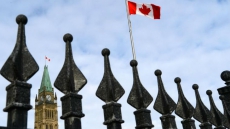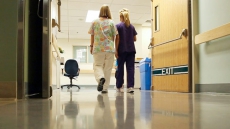Tossing and turning in the middle of the night. Lying awake for lengthy stretches. Waking up groggy. The COVID-19 pandemic seems to be messing with a number of peoples' ability to get a good night's sleep these days. And sleep experts aren't surprised by that.
David Samson, an assistant professor of anthropology at the University of Toronto, believes our restless nights can be caused by our bodies' fear response to the coronavirus outbreak.
Samson described "acute fear" as an adaptive survival mechanism that's proved beneficial to human evolution, keeping our ancestors alive in "challenging environments." But during a prolonged period of increased stress and uncertainty — like a world-wide pandemic — anxiety becomes ongoing, and our bodies don't know how to handle that well.
"When fear becomes chronic, you have a mismatch scenario (regarding) your perception of fear, and that creates an inability to fall asleep," Samson said in a phone interview with The Canadian Press. "With COVID-19, the threat isn't actually a lion or a rival group seeking to take your resources, it's invisible. And humans simply aren't very well-evolved to fight off invisible enemies.
"So it's one of those things that is probably prompting this failure of fear extinction, which is leading to poor sleep ...(because) chronic fear is much more difficult for our species to deal with."
Amanda Jewson, a sleep consultant in Toronto, blames pandemic-related sleep struggles on our bodies' physiological response to stress and anxiety.
She said hormones like cortisol and adrenaline spike when we're afraid, and that makes it difficult to get proper rest.
"When our systems are overfunctioning like this it can actually be really hard for us to biologically want to sleep," Jewson said. "Our bodies are actually revving up and raring to go. So that's a big component.
"But the other thing is it can be hard when we're stressed and anxious to turn off our brains to fall asleep. It's hard to shut it down at the end of the night when there's so much to think about."
Missing out on regular, restorative sleep can have a number of negative impacts.
It can stunt creativity, hinder memory consolidation and curtail emotional regulation, Samson said. But sleep deprivation can also have a contagion affect on anyone you happen to be self-isolating with during the pandemic, he added.
"If you're sleep deprived it actually makes you more antisocial ... and that will create antisocial sentiment throughout your entire group," Samson said. "Imagine you're a family stuck in the same environment and you're not getting enough sleep. Not only is it affecting your emotional regulation, it's also spreading throughout the group as a sort of antisocial cognitive contagion."
So what can people experiencing recent sleep trouble do about it?
Some tips include sticking to consistent sleep schedules, making your bedroom as dark as possible and limiting late-night screen time that messes with melatonin production.
Jewson also suggested a journal activity where people write down their fears and anxieties before going to bed to "get them out of their brains." She urges people to include positive platitudes on their lists too.
"That's really important when we're thinking about all the crappiness," she said. "We need to have some moments of gratitude and thankfulness."
Jewson and Samson both say regulating the amount of negative COVID-19 news being absorbed daily can also help, especially in the hours before going to bed.
Jewson tells clients to tune out pandemic coverage early in the evening to give them a buffer zone of a couple hours before they turn in. People can stay informed, Jewson added, but they don't need the daily number of confirmed cases and deaths burrowing into their every thought.
Limiting news consumption can be difficult to do at a time when people are so attached to Twitter and Facebook.
So Samson said trying to "digest social media on a circadian rhythm" might be helpful.
"Think of it like sugar — insulin works on a circadian rhythm, so you want to be eating sugary things at the midpoint of the day, right?" Samson said. "Well maybe it's the same thing with news and social media.
"We're all going to click on the latest facts of the pandemic just like we're all going to eat sugar. So maybe the right approach is to do that at a peak time, when your body is best-equipped to handle it."
Samson said sleep has become increasingly important during the pandemic because of the positive ways it impacts us both physically and mentally.
"There are two really critical functions of sleep, especially high-quality sleep, and those are emotional regulation and immune strengthening," he said. "And those two things are absolutely critical during this period."




